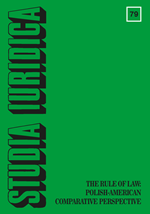Separation of Powers, Checks and Balances, and the Limits of Popular Sovereignty: Rethinking the Polish Experience
Separation of Powers, Checks and Balances, and the Limits of Popular Sovereignty: Rethinking the Polish Experience
Author(s): Ryszard PiotrowskiSubject(s): Constitutional Law, Sociology of Law
Published by: Wydawnictwa Uniwersytetu Warszawskiego
Keywords: separation of powers; checks and balances; rule of law; democracy; the Constitution; human rights; values; sovereign; privacy; new technologies
Summary/Abstract: The principle of checks and balances counts among the most fundamental constitutional values, as it is connected with the recognition and guaranteeing of human rights – in other words is the very essence of the Constitution, an act that limits the majority rule to allow for the rights and freedoms of the individual. Also of key importance is the connection of this precept with the essence of the democratic system, understood as one where the majority rule is constrained by human rights. The principle of checks and balances could function in full only in correspondence with culture of respect for human rights.The status of the sovereign needs legitimacy, which derives from the sovereign’s subordination to the Constitution. Being sovereign means being unsubordinated to anybody. It is thus fair to conclude that the attribute of sovereignty actually belongs to the values that have been shaped by culture and linked to the timeless moral rules and principles corresponding to humanity’s eternal dilemmas – the values that create the constitutional culture, i.e. a community’s set of values. The sovereign does not exercisethe supreme authority over values, and the values are embodied in the Constitution, which is inseparably linked with the people and their sovereignty.The Constitution of the Republic of Poland reflects the precepts of liberal democracy, or such kind of democracy where the sources of human rights do not stem from the will of the majority. The model of governance adopted in the Constitution could be described as consensual democracy.Constitutional practice has taken a course where the system of consensual democracy – as laid down in the Constitution of Poland, with the power of the majority being constrained by rights of the minority – is turning into a system of a majority democracy, based not on a dialogue between the majority and the opposition, but on the power of a parliamentary majority who disregards the systemic role of the opposition.
Journal: Studia Iuridica
- Issue Year: 2019
- Issue No: 79
- Page Range: 78-91
- Page Count: 14
- Language: English

